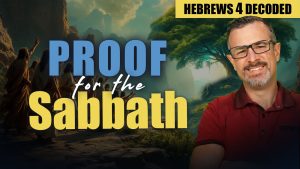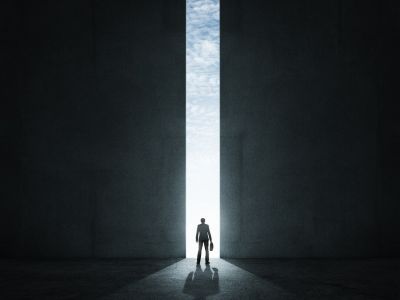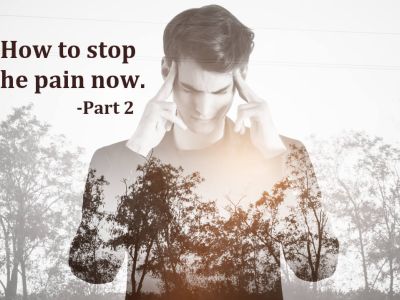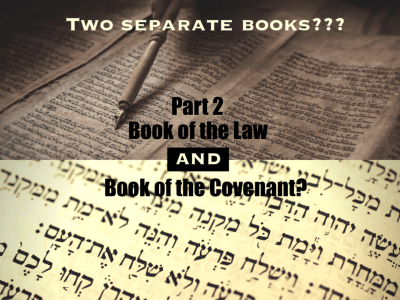Decoding Hebrews – Chapter 4
Decoding Hebrews 4
Proof We Should Keep the Sabbath
 The book of Hebrews is a powerful letter, laser-focused on one critical mission: keeping believing Jews from drifting back into Judaism without the central figure of their faith—Yeshua, Jesus the Messiah. Written with deep urgency and theological richness, Hebrews urges its audience to remain anchored in the truth of who Yeshua is, where He came from, and what He offers. In chapter 4, the author introduces a profound concept that runs through the fabric of Scripture: rest—not merely physical rest, but a divine, prophetic, transformative rest that reaches all the way from creation to the end of the age.
The book of Hebrews is a powerful letter, laser-focused on one critical mission: keeping believing Jews from drifting back into Judaism without the central figure of their faith—Yeshua, Jesus the Messiah. Written with deep urgency and theological richness, Hebrews urges its audience to remain anchored in the truth of who Yeshua is, where He came from, and what He offers. In chapter 4, the author introduces a profound concept that runs through the fabric of Scripture: rest—not merely physical rest, but a divine, prophetic, transformative rest that reaches all the way from creation to the end of the age.
Let’s explore Hebrews 4 verse by verse, as it reveals layers of spiritual truth that apply to each of us today.
A Promise of Rest—But at What Cost?
“Therefore, since a promise remains of entering His rest, let us fear lest any of you seem to have come short of it.” (Hebrews 4:1)
The author begins with a warning—not just an invitation. The rest of God is still available, but it’s not automatic. There’s a risk of falling short, just as many did during the Exodus. The Israelites had heard the gospel in shadow form—deliverance from Egypt, a promised land ahead—but their response lacked one critical ingredient: faith.
“But the word which they heard did not profit them, not being mixed with faith in those who heard it.” (v.2)
They wandered in circles for 40 years, and only two of the original twelve tribes’ spies—Joshua and Caleb—believed God enough to move forward. Their generation perished outside the Promised Land, outside the rest of God. The metaphor is clear: belief determines destiny.
The Three Layers of “Rest”
The beauty of Hebrews 4 lies in its multifaceted metaphor for rest:
- The Promised Land – The physical inheritance, the land flowing with milk and honey, was the “rest” Israel was meant to enter. Yet ironically, it required warfare and perseverance to possess it. Spiritual rest doesn’t always mean ease—it means alignment with God’s promise, even in the battle.
- Yeshua Himself – Jesus is the ultimate rest. He finished the work on the cross, just as God finished His creation on the seventh day. He is our high priest after the order of Melchizedek, not Levi, and His victory over sin, death, and Satan means that in Him, we can rest—even in chaos.
- The Rest of God – A brilliant wordplay in English: we don’t just get “rest” from God—we get the rest of Him, the fullness of His presence, peace, and promise. Like the woman who touched the fringe (tzitzit) of Yeshua’s garment, it’s not about being near Him; it’s about connecting with Him in faith. That is where the power is. That is where the rest is.
Disbelief: The Subtle Thief of Rest
Disbelief is Satan’s oldest trick—rooted in how we think. The Israelites saw giants in the land and concluded that God couldn’t handle it. Their thinking robbed them of rest.
“If I believe that Romans 8:28 is true… I’m in the Joshua-Caleb camp. If I operate in disbelief… my giants will grow larger before my eyes.”
What giants are stealing your rest today? Addictions? Anxiety? Difficult relationships? Disbelief magnifies problems and minimizes God. Faith does the opposite.
The Sabbath Connection: A Prophetic Time Marker
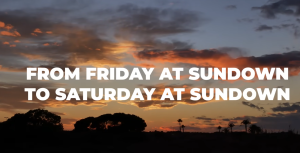 The most surprising turn in Hebrews 4 is when the author ties all of this spiritual “rest” back to the seventh day—the Sabbath:
The most surprising turn in Hebrews 4 is when the author ties all of this spiritual “rest” back to the seventh day—the Sabbath:
“For He has spoken in a certain place of the seventh day in this way: ‘And God rested on the seventh day from all His works.’” (v.4)
This isn’t just theological trivia. The author deliberately connects the metaphorical rest of the Promised Land and the person of Yeshua to the literal Sabbath rest. He quotes Genesis 2, pointing us to a day that God Himself made holy (Hebrew: kadosh), before sin ever entered the world. Let that sink in: Sabbath was not a response to sin. It was built into the rhythm of creation. God wasn’t tired—He was modeling something sacred, prophetic, and deeply relational.
“There Remains a Sabbath-Keeping…”
Now we hit a massive linguistic gem that often gets lost in English translations:
“There remains therefore a rest for the people of God.” (v.9)
But in Greek, this isn’t the same word “rest” used throughout the chapter (katapausis). Here, the author switches to a rare and powerful term: sabbatismos. This word doesn’t just mean rest—it means Sabbath-keeping. It’s not vague or metaphorical. It is the active, continual observance of the seventh day, Shabbat. The literal translation?
There remains a Sabbath-keeping for the people of God.
Why would the author use this word unless he expected Sabbath-keeping to still be relevant for New Covenant believers?
Sabbath: From Genesis to the Millennium
The biblical Sabbath is more than a commandment. It’s a prophetic thread that stretches from Eden to eternity:
- Genesis 2 – God rests, setting the day apart forever.
- Exodus – Israel receives the Sabbath in the wilderness.
- Hebrews 4 – The Sabbath is linked to salvation rest and faith.
- Revelation 20 – The seventh millennium of human history will be the ultimate Shabbat—a thousand years of peace where Messiah reigns.
This is why Sabbath matters. It’s not a relic—it’s a revelation. From the beginning to the end of the story, Sabbath is God’s reminder that He is in control, and He longs to be with us in a unique way.
Sabbath Without Yeshua? Still No Rest.
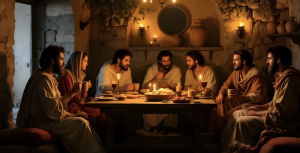 The conclusion of Hebrews 4 is both hopeful and sobering: keeping the Sabbath without faith in Yeshua is incomplete. Ritual without relationship is powerless.
The conclusion of Hebrews 4 is both hopeful and sobering: keeping the Sabbath without faith in Yeshua is incomplete. Ritual without relationship is powerless.
“If you back off your belief in what my Yeshua can do… you will lose the rest. It won’t matter if you keep the Sabbath every week—you won’t have the rest of God.”
Sabbath isn’t a magic formula. It’s a covenantal sign, a sacred space of time where we meet the Prince of Peace. Without Him, the day loses its power. With Him, the Sabbath becomes a portal of divine peace and prophetic purpose.
Alignment, Sacrifice, and Breakthrough: A Call to True Faith
In the journey of faith, alignment matters. The patterns we develop in our lives are not neutral — they pull us into spiritual agreement with the source behind them. When we regularly engage with the Word of God, we align ourselves with heaven. But when we fall into patterns of sin — whether it’s pornography, negativity, or cursing ourselves and others — we inadvertently align with darkness. That alignment has consequences.
So, when life begins to feel like a furnace, when everything seems out of control, perhaps it’s time to evaluate what you’re aligned with. Alignment with sin invites chaos. Alignment with God invites breakthrough. Many people say they believe in God but live in fear, disbelief, or spiritual complacency. They mentally acknowledge God’s existence, but emotionally and practically live as though their giants are undefeatable.
But here’s the truth: faith without action is empty. The work of Jesus on the cross is complete — it is finished. But it means nothing to those who refuse to act on it. The power of God is available, but only for those who are willing to take the cup from Christ’s hand and drink. Faith must be active, tangible, and willing to sacrifice.
The Order of Encounter: Sacrifice First
In Isaiah 6, the prophet says, “Here I am, send me.” But before that declaration, there was an altar, a coal, and a cleansing. The same is true for us.
We can’t expect God’s presence without sacrifice — and real sacrifice costs something. Not token gestures, but authentic acts of obedience and surrender. It’s not about putting a dollar in the offering plate to avoid awkwardness. It’s about laying your life down, piece by piece, in service, in obedience, in worship.
Here’s the divine progression:
- Sacrifice creates fire.
- Fire lights the incense.
- Incense brings the cloud of God’s presence
But none of this happens until you’re on the altar — fully surrendered.
Obedience: The Missing Ingredient
God doesn’t desire sacrifice alone. He demands obedience. It’s not about ritual — it’s about responding to His commands. One of those commands? Keep the Sabbath.
It’s not a suggestion — it’s a top-four commandment. Even before sin entered the world, God established the Sabbath as holy. He told us to “remember” it, precisely because He knew we’d forget. And the enemy has whispered the same lie since the garden: “God didn’t really mean it.” Today, we believe we can worship however, whenever, and on our terms.
But you cannot love God on your terms. Just like in marriage, you love your spouse the way they desire to be loved. So too, we must love our Bridegroom His way.
Naked Before God: No More Hiding
Hebrews 4:12 reminds us: “The Word of God is living and powerful… piercing even to the division of soul and spirit.” We can fool others. We can fool ourselves. But we cannot fool God. Everything is naked before Him — our thoughts, our motives, our private sins.
It’s time to stop pretending. You are already exposed before God. So strip off the pride, the false righteousness, and the self-glorification. Crawl up on the altar. Let Him purify you — refine you into the gold He designed you to be.
Repentance is the First Step to Breakthrough
Some of you need to stop writing comments and start writing confessions — to God. Maybe it’s time to make a literal list: your sins, your habits, your pride, your unbelief. Audit your life. Repent. And most importantly: repent of disbelief.
Disbelief is more than doubt. It’s agreement with the serpent. Break that agreement now. The moment you do, breakthrough begins. Like Daniel, your prayers may be answered the moment they leave your lips — but spiritual warfare may be delaying the response. Keep praying. Keep believing.
 Shalom in the Eye of the Storm
Shalom in the Eye of the Storm
The storm may not pass — but you can still have peace. If you’re centered in God, you’re centered in His shalom. The eye of the storm is the safest place, but only if your eyes are on Him. So choose joy. Choose to believe. Choose to realign your life with the One who holds the universe in His hand — and still cares deeply about your personal situation.
Our Compassionate High Priest
The author of Hebrews continues:
“Since then we have a great high priest who has passed through the heavens—Jesus the Son of God—let us hold firmly to what we profess. For we do not have a high priest who is unable to sympathize with our weaknesses, but One who has been tempted in every way, just as we are—yet without sin. Let us then approach the throne of grace with confidence…” (Hebrews 4:14–16)
Jesus understands your pain, your weakness, your temptation. He’s not distant. He’s empathetic. And He’s waiting for you — not with judgment, but with grace.
The Final Call: Align with Heaven
This isn’t just about biblical knowledge. It’s about knowing the Author of the Word.
Your belief system must align with heaven. Your circumstances may very well be tied to the depth of your belief. Not surface-level belief — but faith that stands when everything shakes.
Don’t wait. Get on your knees. Get on the altar. Realign. Sacrifice. Obey. Believe.
Because giants don’t need to be slain with slings — not when the power of God is already with you.
Watch full teaching here: https://www.youtube.com/watch?v=xYvFuUPvCbI
Jim Staley
Passion For Truth Ministries
Watch full teaching here:
https://www.youtube.com/watch?v=xYvFuUPvCbI
